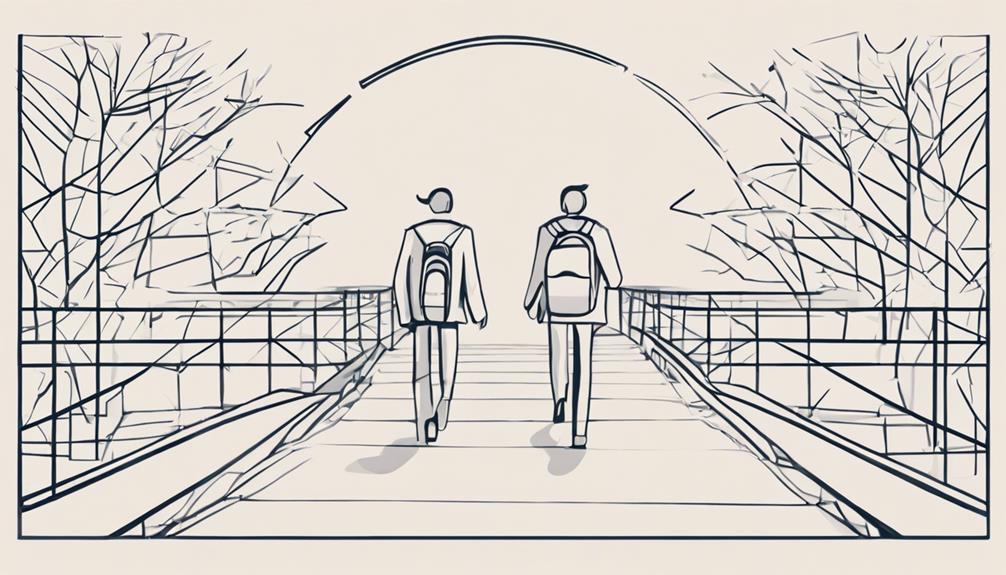Friendships, much like living organisms, undergo transformations influenced by an array of intricate variables. The intricate dance of human connection is subject to the ebb and flow of personal growth, external influences, and internal dynamics. As we embark on this exploration of the nuanced fabric of friendships, one must ponder: What truly catalyzes these shifts in our social tapestry? Join me as we dissect the essence of why friendships change, unraveling the complex interplay of emotions, circumstances, and human nature that shape the evolution of our most cherished bonds.
Key Takeaways
- Personal growth leads to reassessment of values and priorities, affecting friendship dynamics.
- Life transitions like marriage and parenthood shift focus and commitments, impacting friendships.
- Communication breakdowns hinder intimacy and lead to misunderstandings in friendships.
- Changing priorities such as career demands and family responsibilities affect time and energy for friendships.
Reasons for Friendship Changes

Friendship changes are a natural consequence of personal growth and evolving needs. As individuals progress through different life stages at different rates, their values, beliefs, and priorities shift, inevitably impacting their relationships. Childhood friendships, often based on proximity and shared activities, may evolve as individuals mature and seek deeper emotional connections. Adulthood brings about new responsibilities, career pursuits, and family obligations that can alter the dynamics of friendships formed earlier in life. Cultural influences also play a significant role, as societal norms and lack of language around changing friendships can impede open communication.
Furthermore, the reluctance to address shifts in friendships may stem from a fear of confronting the associated grief or discomfort. Acknowledging the reasons behind friendship changes is crucial for fostering understanding and acceptance. By recognizing that evolving life stages and evolving needs naturally influence relationships, individuals can navigate these transitions with greater empathy and awareness.
Impact of Life Transitions
As individuals navigate significant milestones such as marriage and parenthood, their focus and commitments often undergo a noticeable shift, impacting the dynamics of their social interactions. During life transitions, time constraints and increased responsibilities can significantly influence the way individuals engage with their friendships. This impact can be seen in several ways:
- Shift in Priorities: Life transitions lead individuals to prioritize their new roles, such as being a spouse or parent, over social connections, resulting in a shift in focus away from friendships.
- Limited Availability: Increased demands from new responsibilities can create time constraints, leaving individuals with less time and energy to invest in maintaining friendships.
- Changing Values and Interests: Life transitions can bring about changes in values and interests, potentially altering the compatibility of existing friendships as individuals evolve through different life stages.
Balancing the demands of new life stages can naturally lead to a reevaluation of priorities, impacting the time and effort individuals can dedicate to nurturing their friendships.
Influence of Personal Growth

Undergoing personal growth inevitably prompts individuals to reassess their values and priorities, exerting a profound influence on the nature of their social connections. As individuals evolve through personal growth, their perspectives and life experiences change, leading to a shift in the dynamics of their friendships. Self-discovery and evolving beliefs may cause individuals to outgrow certain friendships that no longer align with their newfound values. Moreover, growth in maturity and self-awareness often sparks a desire for deeper, more meaningful connections, resulting in the cultivation of new friendships that resonate with their personal development journey.
| Emotions | Implications |
|---|---|
| Uncertainty | Reevaluation of existing friendships, seeking new connections |
| Reflection | Contemplating the authenticity and depth of current relationships |
| Empowerment | Embracing change and personal growth, forging more fulfilling bonds |
| Loss | Letting go of toxic relationships, making space for positive influences |
| Excitement | Anticipation of forming connections that align with newfound values |
Role of Communication Breakdown
Effective communication is the cornerstone of maintaining healthy friendships. When communication breaks down, misunderstandings and assumptions can arise, leading to emotional strain and instability in relationships. Addressing these communication breakdowns openly can prevent negative implications and foster stronger connections in friendships.
Lack of Clear Communication
Insufficient clarity in communication significantly inhibits the deepening of intimacy within friendships, ultimately impacting the emotional and physical well-being of individuals involved.
Key Points:
- Lack of clear communication hinders the development of intimacy in friendships, leading to surface-level interactions.
- Unclear communication creates stable ambiguity, contributing to emotional distress and potential physical health issues.
- Failure to address communication gaps can result in misunderstandings, conflicts, and the eventual deterioration of friendships.
Effective communication is crucial for fostering meaningful connections and establishing trust in friendships. By openly expressing thoughts, needs, and emotions, individuals can nurture stronger bonds and promote the growth and longevity of their relationships.
Misunderstandings and Assumptions
Misunderstandings and assumptions in friendships often stem from a breakdown in clear and direct communication channels, highlighting the critical role of effective dialogue in maintaining healthy and sustainable relationships. When communication falters, assumptions fill the gaps, leading to misinterpretations of intentions and feelings. Unaddressed assumptions can gradually erode trust and intimacy, creating distance and strain in friendships. Avoiding open communication hinders the resolution of conflicts, allowing misunderstandings to persist and escalate. To prevent the negative impact of assumptions, it is crucial to foster an environment where clear and honest communication is valued and practiced. By addressing assumptions through open dialogue, friendships can navigate through misunderstandings and strengthen their foundation based on mutual understanding and trust.
Effects of Changing Priorities

Changing priorities, such as career advancements and family obligations, can significantly impact the time and energy individuals have available for maintaining friendships. As individuals progress through different life stages, their focus and goals may shift, leading to potential misalignments with the priorities of their friends. Balancing various commitments and interests can create challenges in sustaining the same level of engagement and connection within friendships.
Time and Commitments
How do increasing responsibilities with age impact the time and commitment individuals can allocate to their friendships? As individuals progress through different life stages, their priorities shift, influencing the availability they have for fostering friendships. This shift can be attributed to various factors such as career advancement, family obligations, and personal growth. Here are three ways changing priorities affect the time and commitment individuals can dedicate to their friendships:
- Career Demands: Advancing in one's career often requires more time and energy, leaving less room for social interactions.
- Family Responsibilities: The need to prioritize family commitments can limit the availability for maintaining friendships.
- Personal Growth: Individuals may focus on personal development, leaving less time for socializing and nurturing relationships.
Different Life Stages
As individuals progress through different life stages, their evolving priorities significantly impact the depth and longevity of their friendships. In adulthood, responsibilities such as career advancement and building a family become focal points, often relegating the maintenance of friendships to a lower priority. The diversification of life stages in adulthood further complicates the availability and focus on nurturing friendships. Shifting priorities and values as individuals age present challenges in sustaining adult friendships, as the balance between ideal expectations and busy realities can strain the dynamics of these relationships. Moreover, the inherent tension between independence and dependence in adult friendships is influenced by changing priorities, creating a delicate interplay that affects the development and maintenance of meaningful connections.
Shifting Interests and Goals
In the intricate web of human relationships, the evolution of personal interests and aspirations often acts as a catalyst, propelling friends towards divergent paths and priorities. This shift can lead to significant changes in the dynamics of friendships, influenced by changing priorities and evolving personal goals.
Effects of Changing Priorities:
- Divergence in Interests: Pursuing different life goals may result in friends engaging in activities that no longer align, leading to a disconnect.
- Priority Shift: Friends may prioritize new responsibilities over maintaining the friendship, causing a lack of shared time and interests.
- Distance in Dynamics: Evolving personal goals can create distance as individuals focus on personal growth and development rather than nurturing the friendship.
External Factors on Friendships

External influences play a significant role in shaping the dynamics and outcomes of friendships. Life stages and the time spent together are crucial external factors that impact friendships. As individuals progress through different phases of life, such as starting a career, getting married, or having children, their priorities and availability shift. This can result in friends having less time to spend together, leading to a natural drift in the relationship. Shared activities that once bonded friends may become less frequent or lose their appeal as interests change over time. Additionally, physical proximity plays a vital role in maintaining friendships, as distance can create barriers to regular interactions. External factors such as these can contribute to the evolution or dissolution of friendships. Understanding how these influences shape relationships can help individuals navigate the changes that occur as they and their friends journey through life.
Coping With Distance and Time
Given the intricate interplay of life stages and external influences on friendships, the challenge of coping with distance and time emerges as a pivotal aspect in maintaining meaningful connections. Friendships often face the test of time and distance, requiring individuals to adapt and find ways to nurture these bonds despite the constraints posed by their circumstances. To navigate this challenge effectively, individuals can employ the following strategies:
- Effective Communication: Regular and open communication can help bridge the physical gap between friends, allowing them to stay connected despite busy schedules and different time zones.
- Prioritizing Quality Time: Making the most of the limited time available by engaging in meaningful activities when together can strengthen the bond and create lasting memories.
- Flexibility and Understanding: Acknowledging that life obligations may affect the frequency of interactions and being understanding of each other's commitments can help maintain a sense of closeness even when apart.
Recognizing Unhealthy Dynamics

Recognizing unhealthy dynamics in friendships is crucial for maintaining emotional well-being. Signs of toxicity, such as feeling drained or being unable to be authentic, can indicate a need for setting boundaries. Seeking support and reflecting on specific criteria to evaluate the friendship can aid in recognizing and addressing these detrimental patterns.
Signs of Toxicity
Identifying signs of toxicity in a friendship is crucial for maintaining emotional well-being and fostering healthy relationships. Here are three key indicators of a toxic dynamic:
- Feeling drained after spending time with a friend: If interactions leave you emotionally exhausted rather than rejuvenated, it may signify a toxic relationship.
- Constant belittling, criticism, or disrespect: Unhealthy dynamics often involve one friend consistently undermining the other's self-esteem.
- One-sided relationships lacking reciprocity: When a friendship becomes imbalanced, with one person always taking and the other always giving, toxicity can develop.
Recognizing these signs early on can help prevent emotional or psychological harm and allow for the establishment of healthier boundaries.
Setting Boundaries
Establishing clear boundaries in friendships is a pivotal step in recognizing and addressing unhealthy dynamics that may jeopardize emotional well-being and relationship satisfaction. Setting boundaries helps individuals define acceptable behavior and expectations, safeguarding against manipulation, disrespect, and emotional harm. By setting limits, friends can cultivate mutual respect, encourage open communication, and foster healthier dynamics. Boundaries serve as a protective shield, allowing individuals to uphold their emotional well-being while promoting understanding and respect within the friendship. Recognizing the importance of setting boundaries is crucial for maintaining fulfilling and positive relationships. It is through the establishment and enforcement of boundaries that friends can create a safe and supportive environment where both parties feel valued and respected.
Seeking Support
In assessing the quality of friendships, it is essential to be attuned to signs of emotional exhaustion or a sense of being emotionally drained following interactions with a friend. Recognizing unhealthy dynamics in friendships is crucial for maintaining emotional well-being. Here are three key indicators to identify toxic friendships:
- Feeling drained after spending time with a friend may indicate an unhealthy dynamic.
- Recognizing patterns of combative or critical behavior from a friend is crucial in identifying toxic friendships.
- Noticing a lack of reciprocity or feeling belittled in a friendship are signs of potentially toxic dynamics.
Understanding these signs and reflecting on specific criteria to evaluate friendships can help individuals navigate different life stages and prioritize healthy relationships.
Navigating Emotional Distance

Amidst the intricate web of human relationships, navigating emotional distance in friendships requires a delicate balance of introspection and communication. Emotional distance can arise from various sources such as unresolved conflicts, changes in life circumstances, lack of communication, differing values, or goals that no longer align. To better understand this concept, let's delve into a comparative analysis of factors contributing to emotional distance in friendships:
| Factors Contributing to Emotional Distance | Description |
|---|---|
| Unresolved Conflicts | Issues left unaddressed, causing a rift in the friendship. |
| Changes in Life Circumstances | External factors leading to shifts in emotional connection. |
| Lack of Communication | Absence of meaningful dialogue hindering emotional closeness. |
| Differing Values or Goals | Misalignment in core beliefs or future aspirations affecting the bond. |
Importance of Setting Boundaries
Navigating emotional distance in friendships necessitates a strategic implementation of clear boundaries to safeguard emotional well-being and cultivate robust, mutually respectful relationships. Setting boundaries is crucial as individuals progress through different life stages and seek to maintain friendships as adults. Here are key reasons highlighting the importance of setting boundaries in friendships:
- Emotional Well-being: Establishing clear boundaries helps individuals prioritize self-care and maintain a healthy emotional balance within the friendship. This is particularly essential as adults juggle various responsibilities and stressors in their lives.
- Respect and Autonomy: Boundaries define expectations and limits, promoting mutual respect and understanding between friends. Respecting each other's autonomy through well-defined boundaries fosters a sense of trust and harmony in the relationship.
- Conflict Resolution and Satisfaction: Communicating boundaries effectively can lead to improved conflict resolution, enhanced communication, and increased overall satisfaction within the friendship. Healthy boundaries create a safe space for open dialogue and mutual growth, contributing to the longevity of the relationship.
Strategies for Maintaining Connections

Establishing consistent methods of communication and prioritizing regular face-to-face interactions are essential strategies for maintaining strong connections and nurturing friendships over time. In different life stages, individuals may find it challenging to sustain friendships, especially with close friends. To navigate these complexities, employing specific strategies can be beneficial.
| Strategies for Maintaining Connections | Example | Importance |
|---|---|---|
| Regular Check-ins and Meetups | Scheduled monthly brunch with close friends | Helps in staying connected despite busy schedules |
| Open Communication | Sharing feelings of appreciation and value | Enhances understanding and strengthens bonds |
| Setting Boundaries | Agreeing on personal space and time alone | Preserves emotional well-being and mutual respect |
Embracing Friendship Evolution
As friendships naturally evolve over time, individuals must adapt to changing life stages, responsibilities, and priorities to foster meaningful connections. Understanding the dynamics of friendship evolution is crucial for navigating the complexities of human relationships. Here are three key aspects to consider when embracing the evolution of friendships:
- Awareness of Life Stages: Recognizing that individuals progress through various life stages enables a deeper understanding of their evolving needs and perspectives. Friendships that acknowledge and accommodate these changes are more likely to endure and flourish.
- Flexibility in Priorities: As responsibilities shift with age and circumstances, being flexible in accommodating these changes within friendships is essential. Prioritizing mutual support and understanding can help sustain connections over time.
- Open Communication: Clear and open communication about evolving priorities, values, and expectations is fundamental in navigating friendship evolution. Honest conversations allow friends to address any discrepancies and adapt their relationship accordingly.
Frequently Asked Questions
Is It Normal for Friends to Change?
Friendship dynamics undergo a process of social evolution, making it normal for friends to change. As individuals grow, their priorities, values, and circumstances evolve, impacting their relationships. This natural progression can lead to shifts in friendships as people develop new interests, responsibilities, and personal growth. Understanding and accepting that friends change is crucial for navigating evolving relationships with empathy and maturity. Embracing the normalcy of these changes can help reduce feelings of confusion or guilt.
Why Might Friendships Change?
Friendships may change due to communication breakdowns and conflicting priorities, leading individuals to grow apart as their interests evolve. This natural evolution can occur as people mature and experience life changes. Lack of clear communication about shifting needs and values can strain relationships, causing friends to drift apart. Understanding these dynamics and openly addressing changes can help navigate friendship shifts in a healthy manner.
Do Your Friends Change Over Time?
Friendships do undergo transformations over time, influenced by evolving dynamics and shifting priorities. As individuals mature, their interests and values may change, potentially leading to growing apart from certain friends. Life experiences and personal growth trajectories can also impact the nature of friendships. It is natural for relationships to evolve as individuals progress through different life stages, necessitating adaptability and understanding to maintain meaningful connections.
How Do You Know When a Friendship Is Over?
Recognizing signs indicating the end of a friendship is akin to reading the changing tides of a river; subtle shifts become evident over time. When interactions become burdensome, mutual effort wanes, or emotional exhaustion sets in, it may be time to acknowledge that the bond has run its course. Moving on from a friendship requires introspection and open communication to gracefully navigate the transition and prioritize personal well-being.
Conclusion
In the intricate web of human relationships, the evolution of friendships remains a dynamic and ever-changing phenomenon. As life transitions, personal growth, and shifting priorities impact the dynamics of these connections, the importance of communication, understanding, and mutual respect cannot be overstated. Navigating the complexities of friendship evolution requires a delicate balance of emotional intelligence and adaptability. Embracing the natural changes that occur within friendships ultimately leads to deeper, more meaningful connections.
